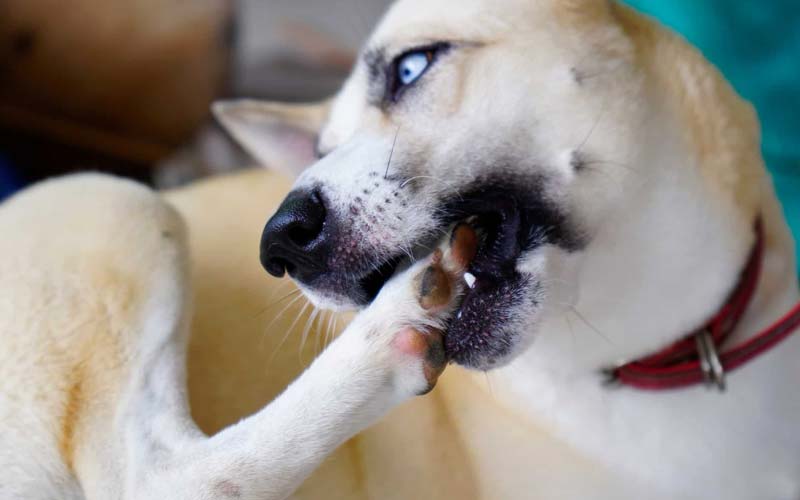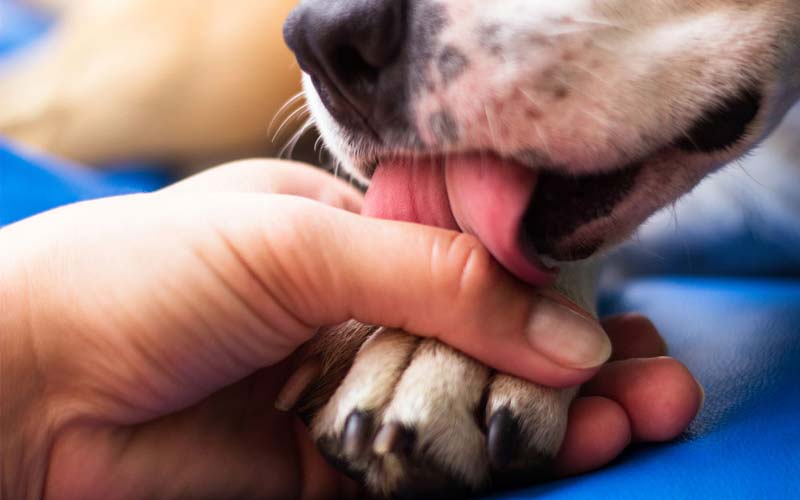Have you ever noticed your furry companion persistently chewing her paws? While some occasional paw licking is normal for dogs, excessive chewing can be a cause for concern. It’s crucial for dog owners to understand the reasons behind this behavior and explore potential solutions. In this blog post, we’ll explore the common causes of paw chewing in dogs and provide you with practical strategies to address the issue.

1. Understanding the Causes of Paw Chewing
- Allergies: Dogs can develop allergies to certain foods, environmental factors, or even specific substances they come into contact with. Paw chewing is a common symptom of allergic reactions in dogs. It’s important to identify and eliminate the allergen to provide relief to your furry friend.
- Skin Infections: Skin infections, such as yeast or bacterial infections, can cause itching and discomfort for dogs. Chewing the paws is a way for them to relieve the itchiness. Regular grooming and proper hygiene can help prevent these infections.
- Parasites: Fleas, ticks, mites, and other external parasites can cause intense itching and irritation, leading to paw chewing. Regularly check your dog for signs of these pests and use appropriate preventive measures.
- Anxiety and Stress: Dogs may resort to paw chewing as a coping mechanism for anxiety or stress. Changes in routine, separation anxiety, or underlying fear can trigger this behavior. Addressing the root cause of anxiety and providing a calm and secure environment can alleviate paw chewing.
- Boredom: Dogs are social animals that thrive on mental and physical stimulation. If they are not provided with enough exercise, playtime, and mental enrichment, they may resort to destructive behaviors like paw chewing. Ensuring your dog gets enough physical and mental exercise is essential.

2. Solutions to Address Paw Chewing
- Consult Your Veterinarian: If your dog’s paw chewing persists or is accompanied by other symptoms like redness, swelling, or foul odor, it’s crucial to consult your veterinarian. They can perform tests, identify underlying issues, and recommend appropriate treatments.
- Allergy Management: If allergies are suspected, your vet may suggest an elimination diet or allergy testing to identify the specific allergen. They may also prescribe antihistamines or recommend hypoallergenic diets to manage the allergies effectively.
- Regular Paw Care: Maintain proper paw hygiene by regularly cleaning your dog’s paws, trimming the fur around them, and checking for any injuries or irritations. This practice can help prevent infections and minimize the urge to chew.
- Parasite Prevention: Use appropriate parasite prevention measures, such as flea and tick treatments, to protect your dog from external parasites. Regular grooming and thorough inspection can help detect any infestations early.
- Anxiety Relief: If anxiety is the underlying cause, consult with a professional dog trainer or behaviorist to develop a training plan that addresses your dog’s anxiety triggers. Providing a safe and comfortable space for your dog and incorporating calming activities can also help alleviate anxiety-related paw chewing.
Conclusion
Paw chewing in dogs can be a sign of various underlying issues, ranging from allergies and skin infections to anxiety and boredom. Understanding the root cause and implementing appropriate solutions can help alleviate your dog’s discomfort. Remember, consulting with your veterinarian is crucial for an accurate diagnosis and tailored treatment plan. By providing the necessary care and attention, you can help your furry friend find relief from paw chewing and enjoy a healthier, happier life.